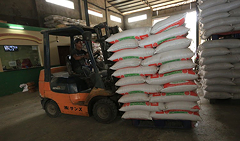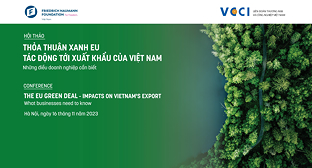Amru urges EU to reconsider tariffs
19/11/2018 12:00

In an open letter to the European Union, Amru Rice, one of the biggest rice exporters, on Friday urged the Europeans to reconsider imposing tariffs on import of Cambodian rice to the bloc following complaints of price imbalances raised by Italy and Spain.
Song Saran, Amru Rice CEO, said the EU should avoid imposing the safeguard clause on Cambodian rice exports, a decision it announced early this month, since Cambodia’s share of the market is too small for its products to impact the pricing of rice from European farmers.
“Cambodia’s share of the EU market is too small for it to impact on prices. We appeal to the Union to get more information from FAO Price Index as the benchmark in the assessment of the price for Indica rice from Cambodia and Myanmar which is said to have affected European farmers.
“If the Union puts in this safeguard clause, it is effectively curtailing efforts by smallholder farmer’s to participate in safe, traceable, environmentally-friendly and sustainable foods for European and global consumers.
“There must be a differentiation in organic and Sustainable Rice Platform (SRP) rice against the conventional Indica rice in line with the intent of the 2030 sustainable development goals (SDG) of promoting organic and SRP agriculture for its comparative advantages to disadvantaged poor farmers and smallholders, create opportunities for women and as part of an effective climate change adaptation strategy,” said the letter.
Italy, along with six other EU countries, filed a request to the European Union to activate a ‘safeguard clause’ allowing EU member states to impose barriers between 175 euros/ton, 150 euros/ton and 125 euro/tons to protect local rice growers against trade imbalances.
Mr Saran said its representation is on behalf of 10,000 smallholder rice farmers and 58 smallholder agricultural cooperatives who are suppliers of fragrant and organic rice and rice produced under the Sustainable Rice Platform (SRP).
The aim is to appeal to the EU for the Commission’s decision to be fair and to be based on the differentiation of rice products under the ‘Indica’ rice type, taking into consideration the dynamics of trade.
Amru Rice’s letter is in reference to the European Commission disclosure of intent to temporarily reintroduce the Common Customs Tariff duties on imports of Indica rice originating from Cambodia and Myanmar following a safeguard investigation pursuant to Article 22 of Regulation (EU) No 978/2012 of the European Parliament and of the Council of Oct 25, 2012.
Mr Saran explained to the EU that Cambodian exports to the EU were focused on jasmine and fragrant rice instead of Indica white rice, with records showing an increase in jasmine and fragrant rice export from 49 percent in 2013 to 62 percent in 2017 and up to 77 percent of fragrant rice by Oct 2018.
However, at the same time, Indica white rice exports decreased from 51 percent in 2013 to 25 percent in 2017 and down to 16 percent by Oct 2018, he said.
“Jasmine and aromatic rice are not grown by Italy growers as their production is more towards Indica white rice. Your own findings already affirmed the decrease in production and milling of Indica rice for reasons that it is favourable to tropical climate, while Japonica fits better to Italy’s colder weather.
“Overall, a differentiation of Indica rice by sub-type would show that Cambodian jasmine and fragrant rice would not be in competition with Indica white rice produced and milled in Italy,” Mr Saran pointed out.
He said the inspection did not differentiate between conventional and organic rice and rice under the SRP. Organic rice is produced under the stringent standards that comply with product standard certification and fair trade certification.
Amru Rice also appealed to the EU to look into its promotion of inclusive rules regarding the environment, labour rights, and sustainable development in its trade deals, as well as opening its markets to trade from the world’s poorest countries.
It says the engagement of Cambodian exporters with the European Union to export safe and high-quality rice products is based on incentives and competitiveness.
Amru Rice also called upon the EU to give more clarification on the safeguard clause and why Cambodian fragrant rice is affected while Thai fragrant rice is not contested by EU planters.
Hun Lak, vice president of the Cambodia Rice Federation, told Khmer Times recently Cambodia enjoys the benefits of the Everything-but-arms (EBA) treaty, but the new tariffs will affect its export to the EU, “making our rice less competitive.”
He said Cambodia must diversify away from the EU market, looking at China instead. However, Cambodia has not fulfilled its export quota to China.
Song Saran, Amru Rice CEO, said the EU should avoid imposing the safeguard clause on Cambodian rice exports, a decision it announced early this month, since Cambodia’s share of the market is too small for its products to impact the pricing of rice from European farmers.
“Cambodia’s share of the EU market is too small for it to impact on prices. We appeal to the Union to get more information from FAO Price Index as the benchmark in the assessment of the price for Indica rice from Cambodia and Myanmar which is said to have affected European farmers.
“If the Union puts in this safeguard clause, it is effectively curtailing efforts by smallholder farmer’s to participate in safe, traceable, environmentally-friendly and sustainable foods for European and global consumers.
“There must be a differentiation in organic and Sustainable Rice Platform (SRP) rice against the conventional Indica rice in line with the intent of the 2030 sustainable development goals (SDG) of promoting organic and SRP agriculture for its comparative advantages to disadvantaged poor farmers and smallholders, create opportunities for women and as part of an effective climate change adaptation strategy,” said the letter.
Italy, along with six other EU countries, filed a request to the European Union to activate a ‘safeguard clause’ allowing EU member states to impose barriers between 175 euros/ton, 150 euros/ton and 125 euro/tons to protect local rice growers against trade imbalances.
Mr Saran said its representation is on behalf of 10,000 smallholder rice farmers and 58 smallholder agricultural cooperatives who are suppliers of fragrant and organic rice and rice produced under the Sustainable Rice Platform (SRP).
The aim is to appeal to the EU for the Commission’s decision to be fair and to be based on the differentiation of rice products under the ‘Indica’ rice type, taking into consideration the dynamics of trade.
Amru Rice’s letter is in reference to the European Commission disclosure of intent to temporarily reintroduce the Common Customs Tariff duties on imports of Indica rice originating from Cambodia and Myanmar following a safeguard investigation pursuant to Article 22 of Regulation (EU) No 978/2012 of the European Parliament and of the Council of Oct 25, 2012.
Mr Saran explained to the EU that Cambodian exports to the EU were focused on jasmine and fragrant rice instead of Indica white rice, with records showing an increase in jasmine and fragrant rice export from 49 percent in 2013 to 62 percent in 2017 and up to 77 percent of fragrant rice by Oct 2018.
However, at the same time, Indica white rice exports decreased from 51 percent in 2013 to 25 percent in 2017 and down to 16 percent by Oct 2018, he said.
“Jasmine and aromatic rice are not grown by Italy growers as their production is more towards Indica white rice. Your own findings already affirmed the decrease in production and milling of Indica rice for reasons that it is favourable to tropical climate, while Japonica fits better to Italy’s colder weather.
“Overall, a differentiation of Indica rice by sub-type would show that Cambodian jasmine and fragrant rice would not be in competition with Indica white rice produced and milled in Italy,” Mr Saran pointed out.
He said the inspection did not differentiate between conventional and organic rice and rice under the SRP. Organic rice is produced under the stringent standards that comply with product standard certification and fair trade certification.
Amru Rice also appealed to the EU to look into its promotion of inclusive rules regarding the environment, labour rights, and sustainable development in its trade deals, as well as opening its markets to trade from the world’s poorest countries.
It says the engagement of Cambodian exporters with the European Union to export safe and high-quality rice products is based on incentives and competitiveness.
Amru Rice also called upon the EU to give more clarification on the safeguard clause and why Cambodian fragrant rice is affected while Thai fragrant rice is not contested by EU planters.
Hun Lak, vice president of the Cambodia Rice Federation, told Khmer Times recently Cambodia enjoys the benefits of the Everything-but-arms (EBA) treaty, but the new tariffs will affect its export to the EU, “making our rice less competitive.”
He said Cambodia must diversify away from the EU market, looking at China instead. However, Cambodia has not fulfilled its export quota to China.
November 19, 2018
Source: Khmer Times
Source: Khmer Times
Các tin khác
- Exports face challenges despite enjoying robust growth (26/04/2024)
- Vietnam ranks fifth among aquatic product suppliers for Singapore (26/04/2024)
- Some firms likely to close due to higher anti-dumping tariff on plywood products in S Korea (26/04/2024)
- Foreign businesses increasingly seek export sources in Vietnam (26/04/2024)
- Japan's investigation into China's graphite electrodes to 'affect regional cooperation' (26/04/2024)
 Home
Home
 About Us
About Us




















